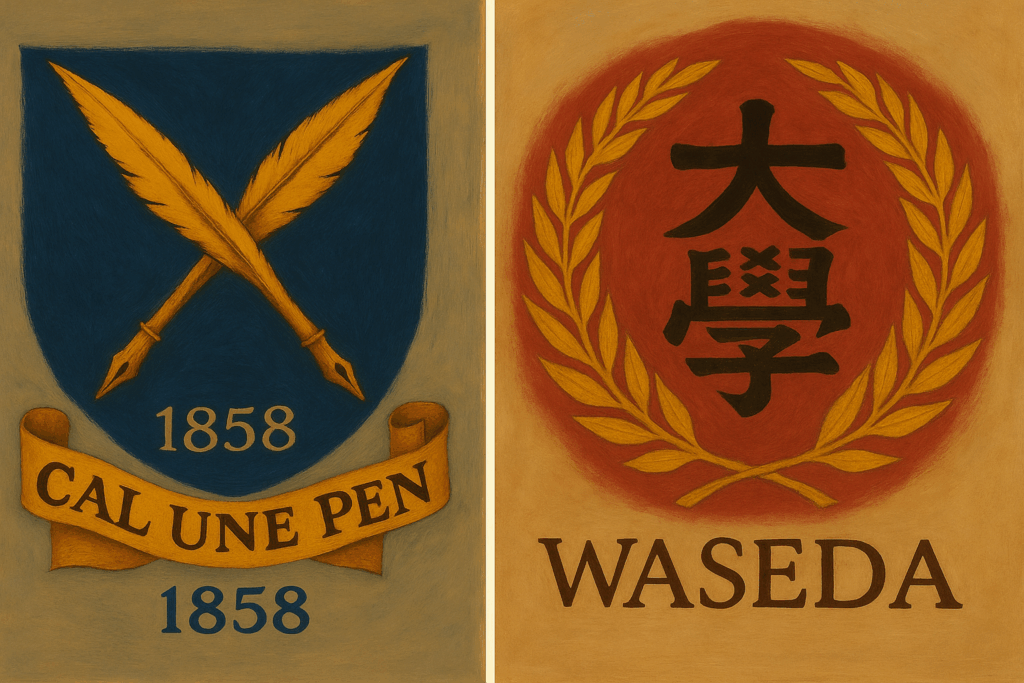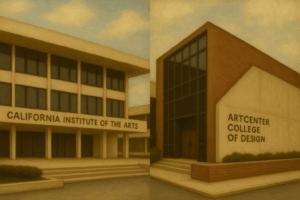
The GOAT of Japanese Private Universities?
Keio University and Waseda University, the two giants of prestigious private education and symbols of Japanese higher learning, are collectively known as “So-Kei” (早慶) and boast a long history and rich tradition. These universities have maintained a fierce rivalry not only in academic excellence but also in various fields like sports and alumni networks, playing a crucial role in shaping Japan’s intellectual, political, and economic landscape.
This article, based on the latest information from 2025, provides a comparative analysis of the two universities to help you explore which one might be a better fit for your future.
1. A Glance at Their Standing: 2025 Key University Rankings
Both universities prove their international reputation by consistently competing for the top two spots among Japanese private universities in major global rankings.
| Ranking Body | Keio University World Rank | Waseda University World Rank | Keio University Japan Private Rank | Waseda University Japan Private Rank |
|---|---|---|---|---|
| QS World University Rankings | 188 | 181 | 1st (10th overall in Japan) | 2nd (14th overall in Japan) |
| THE World University Rankings | 601-800 | 801-1000 | 1st (12th overall in Japan) | 2nd (14th overall in Japan) |
| CWUR World University Rankings | 96 | 222 | 1st | 2nd |
| US News Global | 534 | 586 | – | – |
2. History and Philosophy: The Elite’s ‘Practical Learning’ vs. The People’s ‘Independence’
Keio University: The Elite of ‘Practical Learning’ and ‘Independence and Self-Respect’
Founded in 1858 by Fukuzawa Yukichi as a school for Dutch studies (Rangaku), Keio University is one of Japan’s oldest universities. It has consistently pursued an independent education free from government interference.
Keio’s founding principles are rooted in ‘jitsugaku’ (実学), or practical learning, and ‘dokuritsu jison’ (独立自尊), the spirit of independence and self-respect. This philosophy emphasizes scientific truth-seeking and individual autonomy, fostering a culture that values the practical application of knowledge. Its powerful ‘Mita-kai’ (三田会) alumni network significantly influences graduates’ careers in business and politics, creating an elite identity known as the ‘Keio Boy’.
Waseda University: ‘Academic Independence’ and the ‘Anti-Establishment Spirit’
Founded in 1882 by Ōkuma Shigenobu as the Tokyo Senmon Gakkō, Waseda University aimed to cultivate individuals with practical knowledge and a critical perspective.
Waseda’s founding ideals are ‘academic independence,’ ‘the practical application of scholarship,’ and ‘the fostering of model citizens.’ It particularly values an ‘anti-establishment spirit’ (反骨の精神), independent of government or power. Diversity is a core cultural strength, cultivated through a broad liberal arts education and the recruitment of a large number of international students.
3. Academic and Research Capabilities: A Comparison of Strengths by Field
Keio University: A Leader in Medicine and Interdisciplinary Fusion
Keio University traditionally excels in fields like medicine, law, and economics, and has recently focused on interdisciplinary research.
- Key Faculties: Faculty of Law, Faculty of Policy Management, Faculty of Environment and Information Studies, School of Medicine, Faculty of Economics.
- Research Characteristics: Encourages interdisciplinary learning and early participation in research.
- 2025 Key Research Achievements: Making strides in advanced medical fields like clinical trials for vision regenerative therapy and cancer immunotherapy research. Aims to secure 8 billion yen annually in research funding from the private sector.
Waseda University: A Hub for International Liberal Arts and Practical Engineering
Waseda University shows its strengths in social sciences, led by the School of Political Science and Economics, the School of International Liberal Studies, and various schools of science and engineering.
- Key Faculties: School of Political Science and Economics, School of International Liberal Studies, various Schools of Science and Engineering (Fundamental, Creative, Advanced).
- Research Characteristics: Strong emphasis on foreign language education and practical application.
- 2025 Key Research Achievements: Excelling in both basic and applied research, such as signing a joint research agreement in quantum physics with RIKEN and discovering a protein that could contribute to diabetes treatment.
4. Student and Financial Environment (as of 2025)
Student Composition Comparison
| Category | Keio University | Waseda University |
|---|---|---|
| Total Student Body | 28,789 | 46,802 |
| International Students | 2,197 | Approx. 8,000 |
Tuition and Scholarships
- Tuition: Both universities have annual tuition fees ranging from approximately 1 million to 4 million yen, depending on the faculty. Waseda’s School of International Liberal Studies (approx. 1.69 million yen) and School of Education (approx. 1.04 million yen) are relatively more affordable.
- Scholarships: Keio offers top-tier scholarships like the “Future-Leading International Scholarship,” while Waseda operates a diverse system of grant-type scholarships that benefit nearly all applicants.
5. Alumni Who Moved the World
Keio University: Elites Leading Business and Politics
| Field | Figure | Achievement |
|---|---|---|
| Education/Thought | Fukuzawa Yukichi | Founder of Keio University. Contributed to establishing Japan’s modern education system. |
| Medicine | Kitasato Shibasaburō | ‘Father of Modern Japanese Medicine.’ Co-discovered the plague bacillus and developed tetanus antitoxin therapy. |
| Politics | Junichiro Koizumi | 87th Prime Minister of Japan. Pushed for bold reforms like postal privatization. |
| Business | Masao Ogura | Second president of Yamato Transport. Developed Japan’s parcel delivery service, ‘Takkyubin.’ |
| Sports | Shuzo Matsuoka | Former pro tennis player. Left a major mark on Japanese tennis, reaching the Wimbledon quarterfinals in 1995. |
Waseda University: Pioneers Creating Culture and Industry
| Field | Figure | Achievement |
|---|---|---|
| Politics | Kakuei Tanaka | 64th-65th Prime Minister of Japan. Realized the normalization of Japan-China relations in 1972. |
| Business | Tadashi Yanai | Founder of UNIQLO. Innovated the global fashion industry with the ‘LifeWear’ concept. |
| Literature | Haruki Murakami | World-renowned novelist. Has had a profound influence on modern literature with his unique style. |
| Sports | Takeshi Okada | Head coach of the Japan national football team. Led the team to the Round of 16 in the 2010 South Africa World Cup. |
| Literature | Edogawa Ranpo | ‘Father of the Japanese Detective Story.’ Laid the foundation for Japanese mystery literature. |
Conclusion
As of 2025, Keio University and Waseda University stand as the two pillars of Japanese higher education, each with distinct strengths and a unique identity.
- Keio, based on its philosophy of ‘practical learning’ and ‘independence,’ focuses on cultivating elites in business and politics, boasting a powerful alumni network. It may be more suitable for students who prefer a more structured and elite-oriented educational environment.
- Waseda, emphasizing ‘academic independence’ and an ‘anti-establishment spirit,’ promotes an open culture that embraces a wide range of academic fields and a diverse international student body. It may be more appealing to students who want to forge their own path in an atmosphere of diversity and freedom.
The choice between the two universities will ultimately depend on an individual student’s academic interests, career goals, and preferred educational environment.


